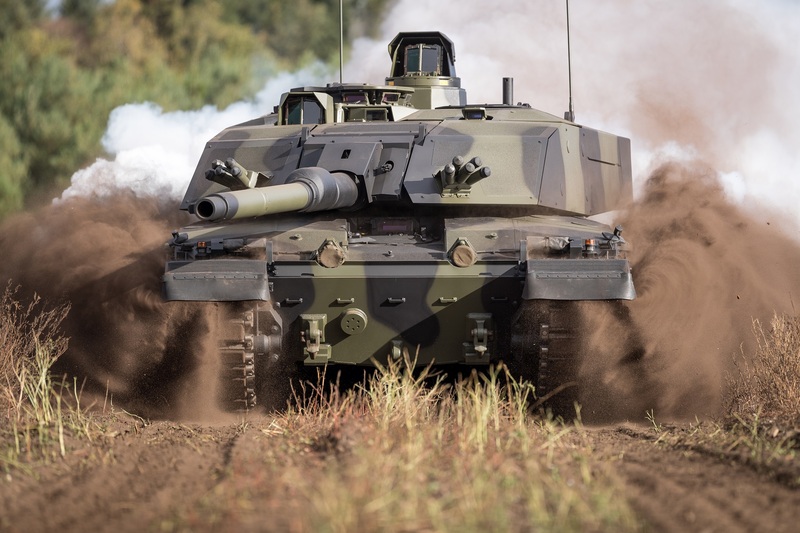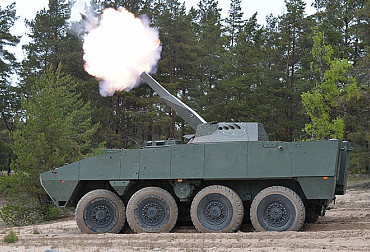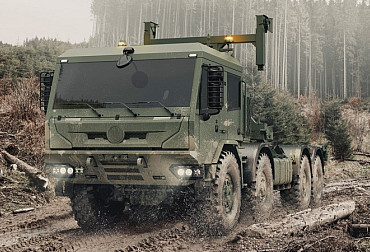Rheinmetall is bringing Britain’s tanks into the modern era
Rheinmetall is at the forefront of global tracked vehicle technology. The German company’s LYNX KF41 is a leading contender for the Czech Republic’s purchase of 210 new infantry fighting vehicles, and is being considered by other armed forces in other renewal programmes around the world. Yet Rheinmetall’s innovation is not limited to the LYNX, as shown by the British armed forces’ selection of the defence industry giant for a pioneering programme to upgrade its main battle tank (MBT) fleet.
 Picture: Prototype of the Challenger 3 tank | Rheinmetall BAE Systems Land / Combat Systems / CC BY-NC-ND
Picture: Prototype of the Challenger 3 tank | Rheinmetall BAE Systems Land / Combat Systems / CC BY-NC-ND
Meeting the Challenge
The British Ministry of Defence has chosen Rheinmetall BAE Systems Land (RBSL) for an £665 million (CZK 20 billion) programme to modernise the country’s MBT Challenger 2 fleet. A total of 148 Challenger 2 tanks will be upgraded to a new Challenger 3 standard to meet the demands of modern battlefields.
The modernisation programme, scheduled to take place until 2027, will see Britain’s Challenger fleet upgraded with a new 120mm high-pressure L55 smoothbore main armament from Rheinmetall providing the ability to penetrate the latest ballistic protection technology, as well as an entirely new turret structure and state-of-the-art digital system architecture. The new armament system will put the Challenger 3 at the forefront of NATO tank technology, and will be able to fire current and future Rheinmetall 120mm kinetic energy rounds as well as programmable ammunition types.
The upgraded main armament will be complemented by new fire control technology and the latest sensor systems, making the Challenger 3 a lethal battlefield threat for the full spectrum of combat scenarios. What’s more, the upgraded tank will feature improved survivability systems for maximum crew protection, enhanced optical sights for better target acquisition and tracking, and all the operational benefits of a network-enabled, fully digitised system now vital for any modern tank or combat vehicle.
“We are honoured to be entrusted with the responsibility of bringing the British main battle tank fleet up to the latest technological standards,” says Oliver Mittelsdorf, Senior Vice President Sales at Rheinmetall Defence. “Our work with the British defence industry will see the Challenger fleet transformed into the most lethal tank in Europe. The know-how of RBSL and Rheinmetall of Germany will be combined for the project, to bring the best possible product to the British armed forces”.
Video: Challenger 3 / YouTube
British Boxers also pack a punch
In addition to the Challenger 2 project, Rheinmetall has been contracted by the British Ministry of Defence to supply a huge 508 Boxer combat vehicles from the ARTEC joint venture of Rheinmetall and Krauss-Maffei Wegmann. The delivered units will include four Boxer variants: an infantry carrying vehicle, a command-and-control variant, a field ambulance type, and a specialist carrier version. These variants exhibit the Boxer’s rare degree of modularity, which allows various modules and systems to be installed without compromising performance.
The first units bought by Britain in the £2.3 billion (CZK 68 billion) deal are scheduled for delivery by the end of 2022. The programme is anticipated to create hundreds of skilled jobs in the UK, with vehicles to be produced at British manufacturing plants and to incorporate custom content made by UK suppliers. The Boxer has also been selected for Australia’s combat vehicle reform programme, with more than 200 units ordered and 25 already delivered.
Local partnerships bringing economic boost
The British Challenger 3 and Boxer programmes will see Rheinmetall working with a range of subcontractors and local defence industry partners to ensure maximum benefits for the British economy. Both programmes are predicted to safeguard and create a large number of skilled jobs – the Challenger programme alone will maintain some 200 workers, including 130 engineers and 70 technicians. Upgrading Britain’s main battle tank will also lead to the offering of over 60 traineeships, and around 450 jobs are expected to be created throughout the British supply chain thanks to the project.
As Rheinmetall’s LYNX infantry fighting vehicle participates in the Czech Republic tender for a major ground forces renewal programme, the company is promising similar benefits to Czech industry. Partnerships with a wide range of local manufacturers for specific elements of the innovative LYNX design would mean significant job creation throughout the country, while integration into Rheinmetall’s global supply chain would result in exciting export opportunities and benefits for the Czech economy as a whole.
“Wherever we supply our products, be they tanks, infantry fighting vehicles or other battlefield technologies, we make sure our presence is beneficial for the local economy,” says Oliver Mittelsdorf. “That means establishing a wide range of industrial partnerships tailored to the specific demands of each programme and the unique capabilities of the national defence industry of the country concerned. In the case of the Czech Republic, a rich defence industrial tradition translates into excellent potential for mutually beneficial cooperation and knowledge sharing”.





















